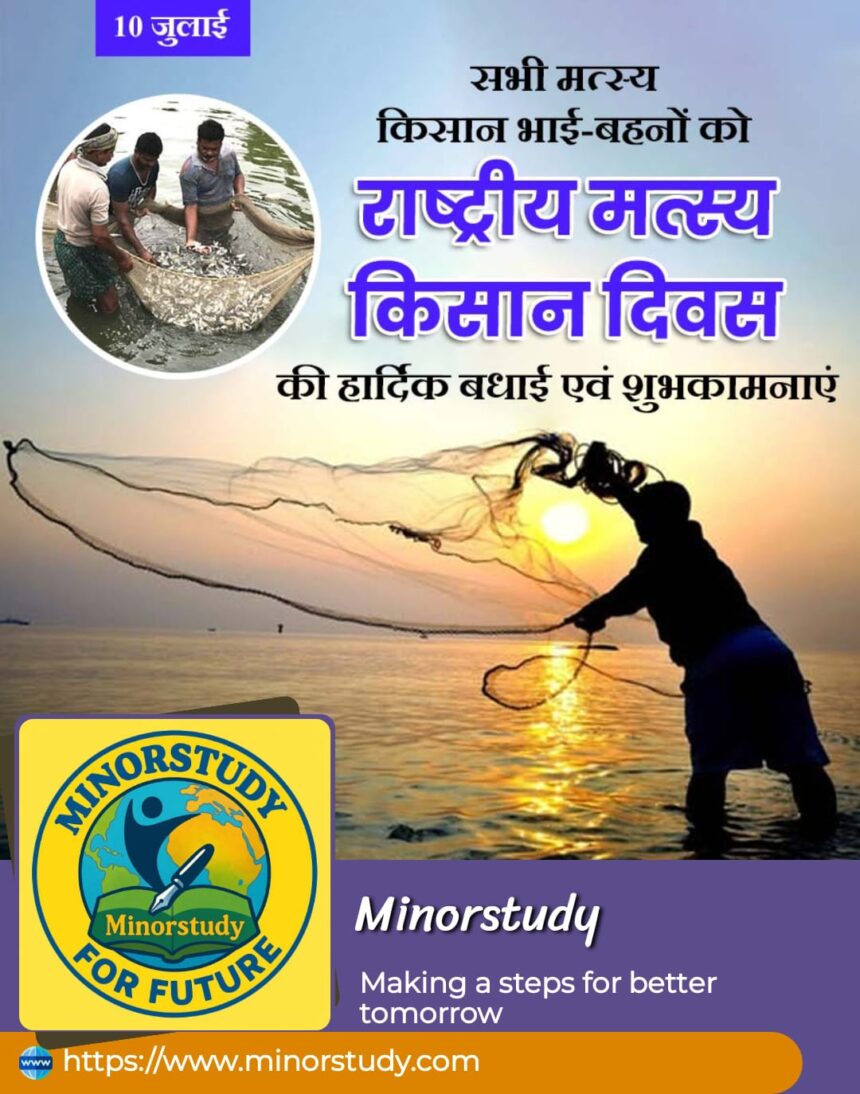🎣 National Fish Farmers Day: Honouring the Unsung Heroes of Aquatic Agriculture
“When we eat a healthy fish, a silent fish farmer somewhere deserves our thanks.”
India’s National Fish Farmers Day is not just a celebration — it’s an acknowledgment of an entire community that feeds the nation, drives the blue economy, and sustains rural livelihoods.
- 📅 Timeline and History of National Fish Farmers Day
- 🧠 What Is National Fish Farmers Day?
- 🐟 Fascinating Facts About Fish Farming in India
- 🎯 9 Powerful Reasons Why National Fish Farmers Day Deserves More Love
- 1. They Feed Millions Every Day
- 2. Backbone of the Blue Economy
- 3. Empowering Rural Communities
- 4. They’re Pioneers in Sustainable Farming
- 5. Fisherwomen Are Breaking Stereotypes
- 6. Aquaculture Creates Micro-Enterprises
- 7. Promotes Scientific Temper
- 8. Fish is a Climate-Friendly Protein
- 9. It Encourages Youth to Enter Agritech
- 🌍 Significance of National Fish Farmers Day in Society
- 🎊 How Is National Fish Farmers Day Observed?
- 💬 FAQs – All You Need to Know
- 💐 Wishing All Our Aquatic Warriors
- 💥 Important Points to Remember
- 🧭 Conclusion: A Day That Binds Water, Work, and Worth
While farmers till the land, fish farmers cultivate life in water. Yet, their contribution is often overlooked. National Fish Farmers Day, observed every year on July 10, is a powerful tribute to these aquatic cultivators.
Let’s dive deep into the history, timeline, significance, observance, facts, FAQs, daily life impact, and the human stories behind this day — all written in a relatable and human-centric tone.
📅 Timeline and History of National Fish Farmers Day
| Year | Milestone |
|---|---|
| 1957 | Dr. Hiralal Chaudhuri and Dr. K.H. Alikunhi successfully induced breeding in Indian Major Carps using hypophysation — a scientific breakthrough in aquaculture |
| 2001 | India begins celebrating July 10 as National Fish Farmers Day in honor of the 1957 landmark event |
| 2015–2020 | Blue Revolution initiatives strengthen fish farming awareness |
| 2021 onwards | Celebrations expand across India, focusing on innovation, training, and sustainable fisheries |
🧠 What Is National Fish Farmers Day?
National Fish Farmers Day is observed annually on July 10 to recognize and honor the contribution of fish farmers, aquaculture scientists, and stakeholders in inland and marine fisheries.
This day also commemorates the historical achievement of induced breeding in Indian major carps by Dr. Hiralal Chaudhuri and Dr. K.H. Alikunhi in 1957, which led to a revolution in Indian aquaculture.

🐟 Fascinating Facts About Fish Farming in India
India is the second-largest fish-producing country in the world (after China).
Over 28 million people in India depend on fisheries and aquaculture for their livelihoods.
The fisheries sector contributes about 1.24% to India’s GDP and over 7% to agricultural GDP.
Over 65% of fish production comes from inland aquaculture.
Government schemes like Pradhan Mantri Matsya Sampada Yojana (PMMSY) have accelerated support and subsidies.
India produces 14+ million metric tonnes of fish annually.
West Bengal, Andhra Pradesh, and Gujarat lead in inland and marine fish farming.
🎯 9 Powerful Reasons Why National Fish Farmers Day Deserves More Love
1. They Feed Millions Every Day
Fish is a key source of lean protein, omega-3 fatty acids, and micronutrients, feeding millions — especially in coastal and eastern India. Fish farmers ensure affordable nutrition reaches households.
2. Backbone of the Blue Economy
India’s Blue Economy depends heavily on sustainable fisheries. Fish farmers contribute significantly to exports, trade, and marine development, pushing India toward economic self-reliance.
3. Empowering Rural Communities
From Assam to Kerala, fish farming provides employment to marginalized groups, women, and tribal populations. It has transformed rural economies through income generation and food security.
4. They’re Pioneers in Sustainable Farming
Many fish farmers now use biofloc, recirculating aquaculture systems (RAS), integrated farming, and eco-friendly fish feeds — ensuring that growth doesn’t come at the cost of the planet.
5. Fisherwomen Are Breaking Stereotypes
National Fish Farmers Day is also a platform to honor fisherwomen — the unsung contributors involved in net-making, drying, processing, and marketing. Their inclusion is empowering families and communities.
6. Aquaculture Creates Micro-Enterprises
Fisheries have created a ripple effect of micro-businesses — hatcheries, ice plants, fish markets, pond maintenance services — thus supporting a vibrant rural ecosystem.
7. Promotes Scientific Temper
This day commemorates scientific achievement, and ongoing research in breeding, disease control, and climate-resilient species helps young minds value science in daily life.
8. Fish is a Climate-Friendly Protein
Compared to beef or pork, fish has a lower carbon and water footprint. Fish farming helps reduce pressure on wild fisheries and supports climate-smart food systems.
9. It Encourages Youth to Enter Agritech
With increasing focus on fisheries entrepreneurship, youths are exploring careers in aquatech, sustainable farming, feed innovation, and export logistics — revitalizing India’s agricultural landscape.
🌍 Significance of National Fish Farmers Day in Society
Cultural Relevance: Fish is central to cuisines and festivals in India (e.g., Bengali, Goan, Assamese).
Economic Impact: Contributes to foreign exchange through exports to EU, USA, and Southeast Asia.
Environmental Responsibility: Sustainable aquaculture ensures biodiversity and water resource management.
Policy Advocacy: It offers a national platform to discuss fishermen’s rights, safety, fair pricing, and insurance.
Community Solidarity: Celebrations often involve honoring families of traditional fishers and tech adopters.
🎊 How Is National Fish Farmers Day Observed?
Across India, especially in fisheries-rich states like Odisha, Andhra Pradesh, West Bengal, Assam, Kerala, Gujarat, and Tamil Nadu, the day is marked with:
Award ceremonies for top fish farmers
Technical workshops on modern practices
Government-led awareness campaigns
Distribution of equipment and fingerlings
Fish fairs and exhibitions
Interactive sessions between scientists and farmers
💬 FAQs – All You Need to Know
Q1. Why is July 10 chosen as National Fish Farmers Day?
Because on July 10, 1957, Indian scientists successfully achieved induced breeding of Indian Major Carps — a turning point in inland fisheries.
Q2. Is fish farming profitable in India?
Yes. With proper training and government support, fish farming is highly profitable and scalable, especially with innovations like Biofloc and tank farming.
Q3. Which is the most commonly farmed fish in India?
Rohu, Catla, Mrigal (Indian Major Carps), Tilapia, Pangasius, and Common Carp are widely farmed.
Q4. What is Pradhan Mantri Matsya Sampada Yojana (PMMSY)?
A flagship government scheme to boost fish production, infrastructure, employment, and export potential in the fisheries sector.
Q5. Can youth take up fish farming as a career?
Absolutely. With rising demand and tech support, aquaculture is one of the most promising agri-startup sectors in India.
💐 Wishing All Our Aquatic Warriors
🌊🐟 On this National Fish Farmers Day, Minorstudy Foundation salutes all fish farmers, researchers, fisherwomen, and aquaculture entrepreneurs across India.
💙 “May your ponds be full, your nets strong, and your future bright.” 🐠🌱
Happy National Fish Farmers Day!
💥 Important Points to Remember
Celebrated every year on July 10
Honours Dr. Hiralal Chaudhuri and Dr. K.H. Alikunhi
Aims to recognize fish farmers and aquaculture innovations
Observed through workshops, award functions, and awareness drives
Contributes to nutrition, employment, exports, and ecological balance
🧭 Conclusion: A Day That Binds Water, Work, and Worth
National Fish Farmers Day is not just about fish. It’s about recognizing every drop of sweat behind every splash, every family that earns from the water, and every innovation that keeps India fed and growing.
Fish farmers are nature’s water stewards and India’s silent breadwinners.
As citizens, let’s respect their efforts, consume responsibly, and support sustainable aquaculture.








